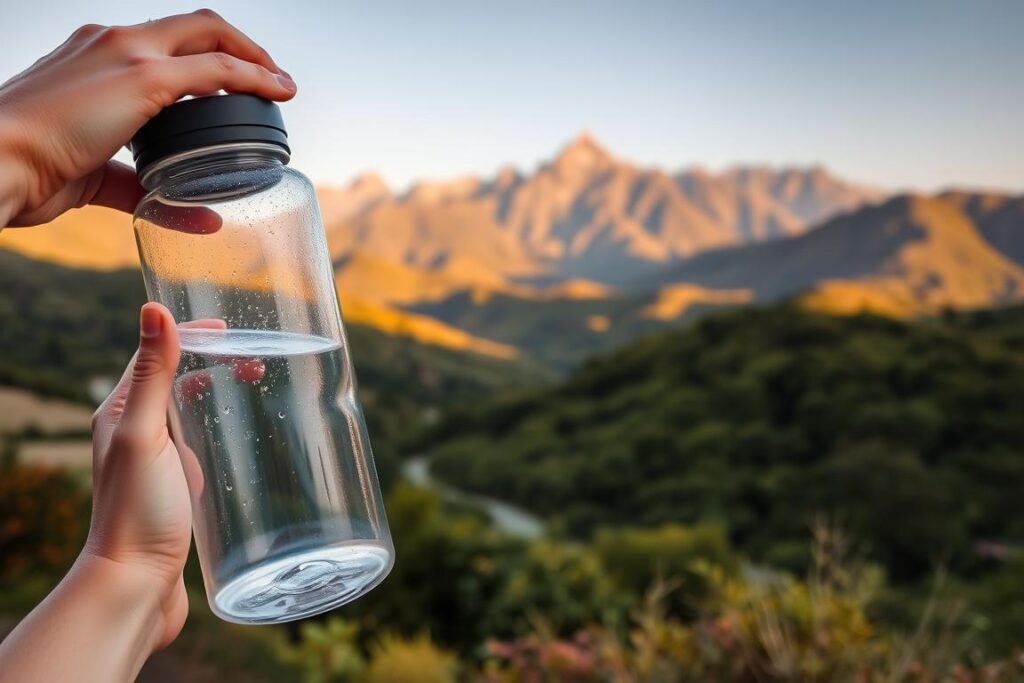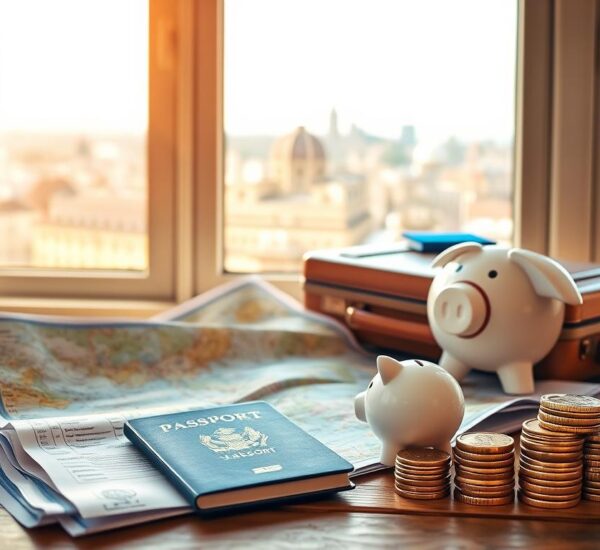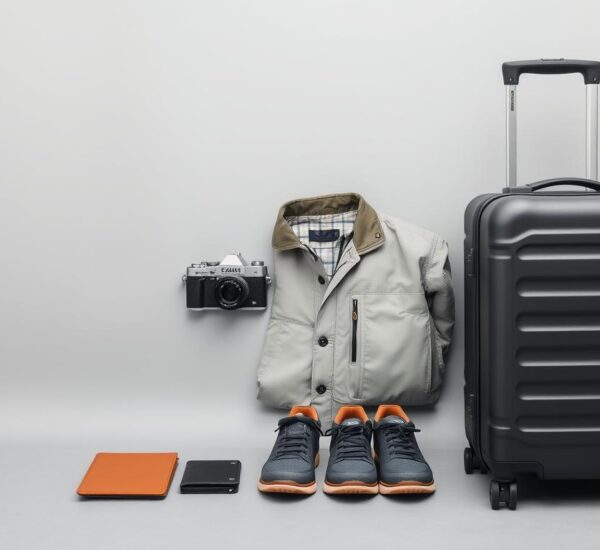Have you ever felt more tired after a trip than before? Traveling is exciting, but it also brings new places, stress, and changes to our routine. This makes us more likely to get sick.
Rick Steves, a famous travel expert, says common sense and basic precautions are vital for staying healthy while traveling. By changing a few things in our travel habits, we can lower the chance of getting sick. This way, we can enjoy our trips more.
We’ll look at the basics of travel health next. We’ll share tips on eating right, staying active, and handling stress. These tips will help you stay full of energy and life during your travels.
Key Takeaways
- Understand the importance of nutrition while traveling
- Learn simple exercises to stay active on the road
- Discover stress management techniques for travelers
- Find out how to maintain a healthy sleep schedule
- Explore tips for managing chronic health conditions while traveling
Understanding the Challenges of Staying Healthy While Traveling
Traveling is exciting, but it also comes with health risks. We need to know about these risks. When we travel, our daily routines change, and we face new health challenges.
Traveling can expose us to many health risks. Common health risks during travel include stomach bugs, respiratory infections, and injuries. Knowing about these risks helps us avoid them.
Common Health Risks During Travel
Travel makes us more likely to get sick. This is because our environment changes and we meet new germs. Some common risks are:
- Food and waterborne illnesses
- Respiratory infections
- Injuries from accidents or physical activities
- Vector-borne diseases
Knowing these risks helps us take steps to stay safe. We can get vaccinated, stay clean, and watch our surroundings.
Why Traditional Routines Get Disrupted
Travel messes up our usual habits, like eating, sleeping, and exercising. This can make us tired, upset our stomachs, and weaken our immune system. For example, changes in diet can upset our stomachs, and not moving enough can make us feel weak.
The Impact of Travel on Your Body
Travel can really affect our bodies, both physically and mentally. Things like jet lag, different climates, and varying altitudes stress our bodies. Also, being stuck in a small space can cause problems like DVT and dehydration.
By understanding these challenges, we can take steps to stay healthy while traveling.
Pre-Trip Health Preparations
Getting ready for travel starts long before we leave. As travelers, our health is our most valuable asset. It’s key to prepare it for the journey ahead. Visiting a doctor before traveling is a must for staying well on the go.
Health experts say getting vaccinated early is key for a healthy trip. It keeps us safe from diseases in our destination and stops infections from spreading. Vaccinations are a critical part of traveler wellness, and they’re very important.
Also, a pre-trip health check can spot health risks at our destination. It’s a chance to talk about our travel plans and get advice on staying fit while on the road.
Pre-trip prep also means checking our current health and making changes if needed. This could be updating our meds, changing our health routines, or knowing our limits. These steps help lower the chance of health problems while traveling.
By focusing on health before we travel, we make our journey healthier and happier. A healthy traveler is a happy traveler, ready to enjoy all the fun and experiences of their trip.
Essential Travel Health Kit Components
A good travel health kit is key to staying healthy on the road. Travel can bring health challenges, like new foods and less activity. The right supplies can help us handle small health issues before they get big.
Let’s look at the must-haves for a travel health kit. These items help us stay healthy and enjoy our trips fully.
Must-Have Medications
It’s vital to pack prescription medications in their original packaging. Include a copy of the prescription and a letter explaining the medication. This is important for customs and emergencies.
We should also pack over-the-counter (OTC) medications for common travel health issues. These include pain relievers, antihistamines, and anti-diarrheal meds.
| Medication Type | Purpose | Examples |
|---|---|---|
| Pain Relievers | To alleviate headaches, fever, and body aches | Acetaminophen, Ibuprofen |
| Antihistamines | To treat allergic reactions | Diphenhydramine, Loratadine |
| Anti-diarrheal Medications | To manage diarrhea and gastrointestinal upset | Loperamide, Bismuth subsalicylate |
First Aid Essentials
A travel health kit should also have first aid essentials for minor injuries. This includes bandages, antiseptic wipes, and tweezers.
- Bandages and band-aids for cuts and scrapes
- Antiseptic wipes to clean wounds
- Tweezers for removing splinters
- Medical tape to secure bandages
Wellness Supplements
We might also pack wellness supplements to support our health while traveling. These include vitamins, probiotics, and immune-boosting supplements.
Probiotics are great for gut health, which is important when trying new foods and environments.
With these essential items in our travel health kit, we can ensure a healthy and enjoyable trip.
Staying Healthy on the Road: Travel Health Tips
Traveling can be tough, but we can stay healthy with the right tips. It’s all about healthy habits like eating well, drinking water, and sleeping enough.
For eating healthy while traveling, choose local, fresh foods. Avoid raw or undercooked foods to stay safe. For more tips, check out our article on dietary strategies for controlling type 2.
Staying fit on the go is key. Try stretching, jogging, or bodyweight exercises in hotel rooms or during breaks. Walking or biking instead of driving also helps keep you fit.
| Travel Health Tip | Benefits |
|---|---|
| Eating local, fresh produce | Boosts immunity, provides essential nutrients |
| Staying hydrated | Prevents dehydration, maintains energy levels |
| Simple exercises during travel | Reduces stiffness, improves circulation |
By following these travel health tips, we can have a healthier and happier trip. Staying active while traveling keeps us physically and mentally fit.
Maintaining Proper Nutrition During Travel
Traveling can make it hard to eat well, but there are ways to stay healthy. It’s important to keep up with good nutrition while traveling. This helps us enjoy our trips more. We’ll look at tips for smart snacking, choosing healthy restaurant options, and meal prep on the go.
Smart Snacking Strategies
Snacking is key when we’re traveling, as it keeps our energy up. Choosing snacks that are full of nutrients like nuts, fruits, and energy bars is smart. It’s best to avoid snacks that are too sweet or salty.
- Go for snacks that are high in fiber and protein.
- Steer clear of processed snacks.
- Drink plenty of water all day.
Restaurant Menu Navigation
Eating out can be tough when we want to eat healthy. Reading menu descriptions carefully and asking for changes can help. Look for dishes that are grilled, baked, or steamed. Avoid fried foods.
- Find healthy dishes on the menu.
- Ask for dressings and sauces on the side.
- Watch how big your portions are.
Meal Prep While Traveling
Meal prep isn’t just for home; it works for travel too. Preparing meals ahead of time or choosing hotels with healthy food options is helpful. Pack non-perishable items like canned goods or dried fruits.
Here’s a simple comparison of meal prep options while traveling:
| Meal Prep Option | Pros | Cons |
|---|---|---|
| Preparing Meals in Advance | Healthy, cost-effective | Requires planning, storage space |
| Hotel Meal Options | Convenient, no storage needed | May be expensive, limited healthy options |
| Non-Perishable Snacks | Easy to pack, long shelf life | Limited nutritional value if not chosen carefully |
Exercise Strategies for the Road
Exercising on the road is more than just staying fit. It helps us deal with travel stress too. When we travel, our usual routines get broken, and unhealthy habits can sneak in. But, by adding simple exercises to our travel plans, we can keep our body and mind healthy.
One simple way to stay active is to use our surroundings. We can walk around cities, take stairs instead of elevators, or do a few jumping jacks in our hotel room. Carrying lightweight exercise gear like resistance bands or a yoga mat can also help us stick to our fitness goals.
For those with more time, trying out local outdoor activities is a great option. This could mean hiking, biking, or trying a new water sport. It’s not just a workout; it also makes our travel more interesting by letting us explore more.
Another good idea is to do bodyweight exercises every day. Squats, lunges, push-ups, and planks are all good without needing any equipment. We can also find fitness videos online for help or motivation.
Lastly, being flexible with our exercise routine is key while traveling. Some days we might have more time than others. The important thing is to stay consistent and make the most of our time. By focusing on our health and fitness, our travels can be both fun and good for us.
Sleep Optimization While Traveling
Staying well while traveling is more than just staying active. It also means getting good sleep. When we travel, our sleep can get disrupted. This affects our health and how we enjoy our trip.
Creating a Sleep-Friendly Environment
Getting quality sleep while traveling is key. It’s hard, though, in places we don’t know well like hotel rooms. To help, we can use a few simple tricks:
- Bring earplugs and an eye mask to block out noise and light.
- Use a white noise app to create a soothing background sound.
- Adjust the room temperature to a comfortable level.
Managing Time Zone Changes
Traveling to different time zones messes with our sleep. It’s hard to fall and stay asleep. To handle this, we can:
- Slowly change our sleep schedule a few days before traveling.
- Stay hydrated and avoid big meals before bed.
- Get outside in the daytime to help our body clock.
| Time Zone Adjustment Tips | Benefits |
|---|---|
| Adjust sleep schedule before travel | Reduces jet lag impact |
| Stay hydrated | Helps maintain energy levels |
| Exposure to natural light | Regulates circadian rhythms |
Bedtime Routines on the Go
Having a bedtime routine is important. It tells our body it’s time to sleep. While traveling, we can keep this routine by:
- Reading a book or listening to calming music before bed.
- Avoiding screens for at least an hour before bedtime.
- Doing relaxation techniques like deep breathing or meditation.
By keeping a bedtime routine, we sleep better. We wake up feeling fresh and ready for the day.
By using these tips, we can sleep well while traveling. This means we’re rested and ready to enjoy our trip fully.
Hydration Strategies for Travelers
Staying hydrated is key to our travel wellness. It affects our energy and how much we enjoy the trip. Rick Steves says it’s vital for staying healthy on the road. Neglecting hydration can cause fatigue, headaches, and weaken our immune system.
To stay hydrated, drink plenty of water all day. Aim for 8-10 glasses daily, adjusting for your activity and climate. Eating hydrating foods like fruits and veggies also helps.
Effective Hydration Tips:
- Carry a refillable water bottle for easy access to water.
- Stay away from sugary drinks and caffeine, as they can dehydrate you.
- Check your urine color; it should be pale yellow if you’re drinking enough water.

By focusing on hydration, we can make our travels better. We’ll stay energized and healthy. These tips will help us enjoy our trips more.
Mental Wellness During Extended Travel
Traveling for a long time can be exciting but also tough on our minds. The thrill of seeing new places can be lost in stress, loneliness, and missing home.
It’s key to keep our minds healthy while traveling. This means handling stress, staying in touch with family, and using technology wisely.
Stress Management Techniques
Dealing with stress is essential for mental health on the road. Meditation and deep breathing exercises can help. Also, staying active through exercise can lower stress.
- Practice mindfulness through meditation or yoga.
- Engage in physical activities like walking or jogging.
- Use deep breathing exercises to calm your mind.
Maintaining Social Connections
Keeping in touch with family and friends can fight loneliness. Thanks to technology, it’s easier than before.
- Schedule regular video calls with loved ones.
- Use social media to keep friends and family updated on your travels.
- Join travel groups or communities to connect with fellow travelers.
Digital Wellness Tips
In today’s world, our devices are essential for travel. They help us navigate, entertain ourselves, and stay in touch. But too much screen time can harm our mental health.
To stay digitally well, follow these tips:
- Set boundaries on your screen time.
- Use apps that promote mental wellness, such as meditation guides.
- Take digital detox days where you limit your use of electronic devices.
By using these tips, we can keep our minds healthy while traveling. This way, we can enjoy our trips more fully.
Managing Chronic Health Conditions on the Road
Traveling with chronic health conditions can be tough, but it’s doable with the right approach. We know managing your health on the move needs careful planning and prep.
It’s key to keep up with your meds while traveling. Pack your medications in your carry-on luggage so they’re easy to get to. Keep a list of your meds, including names, dosages, and how often you take them. Also, carry a copy of your prescriptions.
Before you leave, look up healthcare spots along your path. Knowing where to get help if you need it can really help. Also, see your doctor before you go to talk about any worries and get any needed shots or meds.
Being ready for emergencies is also important. Carry a medical alert device or wear a medical ID if you have a serious condition. Learn about local emergency services and keep their numbers handy.
Here are some more health tips for travelers with chronic conditions:
- Drink plenty of water and eat healthy foods to keep your energy up.
- Watch your condition closely and adjust your plans as needed.
- Keep a travel journal to track your health and any changes.
| Preparation | Importance | Tips |
|---|---|---|
| Medication Management | High | Pack in carry-on, list medications |
| Research Healthcare Facilities | High | Identify facilities along your route |
| Doctor’s Check-up | High | Discuss travel plans, get vaccinations |
By following these tips and being ready, people with chronic health conditions can have fun trips while staying healthy.
Avoiding Common Travel-Related Illnesses
Staying healthy while traveling is more than just packing the right stuff. We face new places, climates, and germs that can make us sick. Knowing how to avoid common illnesses can make our trips better.
Food Safety Guidelines
One big risk when traveling is eating or drinking something contaminated. It’s key to be careful about what we eat and drink. Here are some key food safety guidelines to follow:
- Opt for bottled or filtered water instead of tap water.
- Avoid consuming undercooked meat, seafood, or eggs.
- Choose fruits and vegetables that can be peeled or are thoroughly cooked.
- Be cautious with street food; ensure it’s cooked properly and served hot.
Following these tips can help us avoid foodborne illnesses. For more on staying healthy, including diet, check out our article on building a strong immune system through lifestyle.
Air Travel Health Tips
Air travel can be tough on our health. The air is dry, we’re close to others, and air pressure changes. To stay healthy on flights:
- Stay hydrated by drinking plenty of water before, during, and after the flight.
- Move around the cabin periodically to prevent blood clots.
- Avoid close contact with anyone showing signs of illness.
- Consider using a face mask to reduce exposure to germs.
Public Space Hygiene
Places like airports, train stations, and tourist spots are full of germs. To stay healthy in these areas:
- Frequently wash our hands with soap and water or use hand sanitizer.
- Avoid touching our faces, specially our eyes, nose, and mouth.
- Use a tissue or our elbow to cover our mouth when coughing or sneezing.
- Regularly clean and disinfect our travel gear, such as luggage handles and phone cases.
By following these tips, we can cut down on germ exposure and illness risk while traveling. Staying healthy on the go is about being ready and taking steps to protect ourselves.
Emergency Health Situations: Be Prepared
Traveling means we must be ready for health emergencies. Being prepared can greatly affect how we deal with unexpected medical issues on the road.
First Aid Essentials are key in our travel health kit. We should carry items like band-aids, antiseptic wipes, pain relievers, and any needed medications.
Having a plan for emergencies is also essential. We need to know where hospitals are, have emergency contact numbers, and consider travel insurance for medical emergencies.

Keeping up with road trip nutrition and staying hydrated can prevent some health problems. We should eat balanced meals and snacks and drink lots of water during our trip.
Knowing about local health issues and taking precautions can boost our travel wellness. Being prepared and proactive can reduce risks and make our trip healthier.
Adding travel fitness to our routine can also keep us healthy. Simple activities like stretching and short walks can make a big impact.
Building Sustainable Travel Health Habits
To stay healthy on the road, we must build lasting habits. Travelers face unique challenges that can affect our well-being. But, by adopting sustainable health practices, we can keep our health up, even on long trips.
Creating routines that work in different places is key. We need to be flexible with our exercise, diet, and sleep. This way, we can stay consistent, no matter where we are.
Creating Adaptable Routines
Adaptable routines are vital for staying fit while traveling. Here’s how:
- Research local gyms or outdoor spots at our destination
- Pack versatile workout gear, like resistance bands
- Choose places to stay with fitness options or parks nearby
Having a flexible plan helps us meet our health and fitness goals, even when travel plans change.
Long-Term Wellness Strategies
Long-term wellness strategies are key for health on long trips. This includes:
- Focus on healthy travel habits like balanced eating and regular exercise
- Manage stress with mindfulness or meditation
- Stay in touch with loved ones to keep our mental health strong
By adding these strategies to our travel routine, we make our trips enjoyable and healthy. This way, our travel experiences boost our health and well-being.
Conclusion: Your Journey to Healthier Travel
Staying healthy while traveling is all about good habits, planning, and preparation. By adding travel fitness to your routine, you can reduce travel risks. This way, you keep your health in check, even when you’re on vacation.
We’ve shared many tips for a healthy trip, from getting ready before you leave to managing health issues while traveling. By using these strategies, you can enjoy your travels and stay healthy. For more tips on mental wellness, check out Prosper Glow.
By making health a priority on your travels, you make your trips better and less stressful. Taking care of your health on the road is a smart choice. It keeps you feeling good and energized, no matter where you are.



